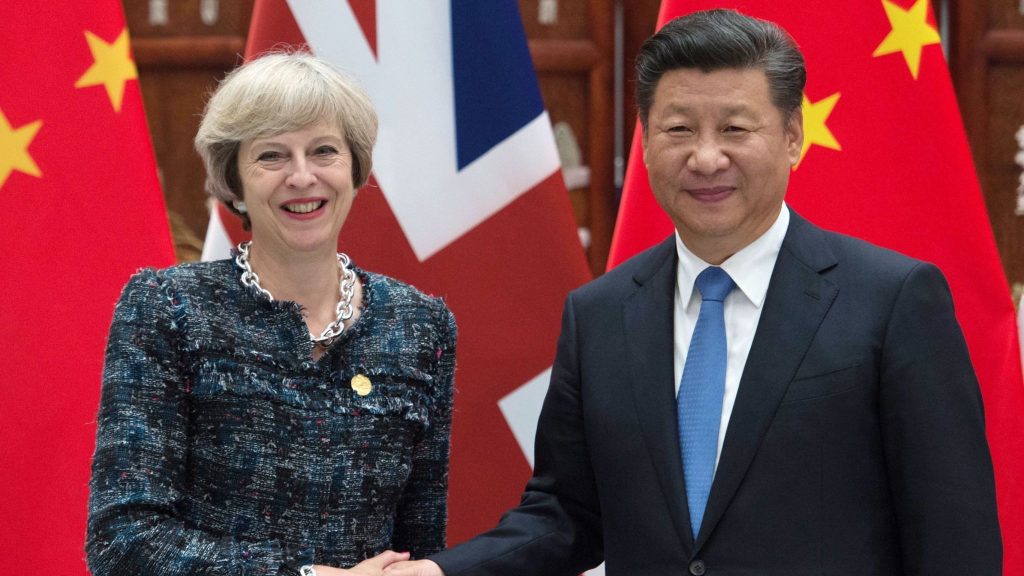Downing Street is racing to finalise dozens of corporate deals between British and Chinese companies as Theresa May prepares for her first visit as Prime Minister to the world’s second-largest economy.
Sky News has exclusively obtained the list of businesses that will be represented on Mrs May’s trip to China next week.
More than 40 companies, universities and trade associations will travel with the PM as she seeks to demonstrate that Britain will be able to boast burgeoning post-Brexit trade ties with Beijing.
Among those joining Mrs May on the trade mission will be blue-chip public companies including BP, HSBC, Inmarsat, Standard Chartered, Sirius Minerals, Standard Life Aberdeen, AstraZeneca and the London Stock Exchange Group, an insider who has seen the list said on Friday.
The composition of the delegation also reflects many of the Government’s priorities outlined in the industrial strategy it published late last year, with clean technology businesses such as Tevva Motors included on the trip.
Tevva is one of a number of automotive sector companies due to accompany Mrs May, with others including Aston Martin, testing group Horiba Mira, Jaguar Land Rover, McLaren and Norton Motorcycles.
The education sector will also be a focus, with the itinerary including a stop-off in Wuhan, a city in Hubei province which has become a major Chinese education hub, as well as Beijing and Shanghai.
Private companies include Canary Wharf Group, technology group Blippar, manufacturer Far-UK, children’s food producer Kiddylicious, healthcare diagnostics provider Medopad, energy and waste management company NPL Group and bioscience firm Stream Bio.
A number of quangos and lobbying groups, including the British Educational Suppliers Association, CBI, Institute of Directors, Medicines and Healthcare products Regulatory Agency, Scotch Whisky Association, UK Skills Partnership and Universities UK, are also on the list.
The other organisations due to attend, according to a source, are the Agriculture and Horticulture Development Board; Arup, the engineering consultancy; Busy Bees, a chain of nurseries; China-Britain Business Council; Cambridge Science Park; Connect China; the Eden Project; Kendal Nutricare, an infant formula maker; Manchester University; PriestmanGoode, a transport design consultancy; R5FX, a foreign exchange trading business; Rooney Fish; advanced materials producer Versarien; Whittard of Chelsea, the upmarket tea producer; and WorldFirst, a foreign currency specialist.
Sources said that Downing Street officials were hopeful of seeing well over 50 partnerships, alliances and other deals signed during the trip, the plans for which were revealed by Sky News last month.
One insider said the figure could be as high as 100, although they declined to put a monetary value on next week’s potential announcements.
Government estimates of the value of previous UK-China deals have been criticised as fanciful, and sources said it was crucial that Mrs May’s trip provided a strong foundation for future talks about a bilateral trade deal between the two countries.
The PM has spoken frequently of her ambition for a “global Britain”, but the UK continues to lag European rivals such as France and Germany in terms of the amount of business it does with China.
While Mrs May’s delegation is much smaller than one which accompanied her predecessor, David Cameron, it is thought to be the largest to join her on any overseas trade mission since she became PM.
Mrs May said last January that she would visit China “relatively soon”, since when she has faced a string of delays – some of which were self-inflicted.
An earlier date was removed because of the General Election campaign, while another provisional visit in November was postponed because of its close proximity to a trip by Donald Trump, the US President.
Liam Fox, the International Trade Secretary, will travel with Mrs May, while Philip Hammond, the Chancellor, travelled to China last month as part of the annual Economic and Financial Dialogue between the two governments.
A number of deals were announced during his visit, although most were evolutions of previous agreements rather than entirely new projects.
Commercial links between the UK and China – now the world’s second-largest economy – will take on greater significance after Brexit, partly because of the latter’s continued rapid growth, as well as Britain’s need to demonstrate its ability to construct mutually beneficial trade deals.
There remains the possibility of a “cliff-edge” Brexit which could leave the UK reverting to World Trade Organisation rules, while the Cabinet is still riven with infighting over the terms of the UK’s departure from the EU.
President Xi Jinping gave a landmark speech espousing the benefits of free trade at the World Economic Forum in Davos last January, and Beijing has welcomed the UK’s talk of a “golden era” in Anglo-Chinese ties.
However, Mrs May has been perceived by Chinese officials to be far more cautious towards the country than Mr Cameron, with Nick Timothy, her former aide, decidedly lukewarm about Chinese investment in British technology and nuclear energy projects.
Chinese-backed companies have invested billions of pounds in corporate Britain, including through the recent takeover of the chipmaker Imagination Technologies.



